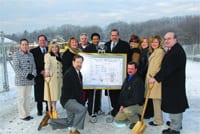Under One Roof Outpatient Dialysis Center to Open This Summer at Heritage Hall
Joseph Carlucci recalls the first time his company, American Renal Associates, installed an outpatient dialysis unit in a nursing home.
It was in Washington, D.C., and the project required an extensive application called a ‘certificate of need.’ In making the case, he learned a lot about a day in the life of a nursing-home resident with kidney failure.
“It’s grueling,” said Carlucci, founder and CEO of the Beverly-based, national dialysis provider. “Early in the morning, they might be transported to a dialysis center, wait, have their treatment — which lasts three and a half hours — then wait for the van to bring them back home. And that van might stop at several different nursing homes. It turns into a six-, seven-, eight-hour day.
“That’s a lot of time, three days a week, and often they’re frail,” he added. “Many people can just hop in their car and drive themselves, but this is a different kind of population.”
Dialysis patients who live at Heritage Hall in Agawam, however, will now have it a little easier, with American Renal Associates set to open a free-standing facility on that property, the company’s fifth such center based at a skilled-nursing facility.
“There are a number of outpatient kidney dialysis facilities in Western Mass., but this is the first time in Western Mass. that one has been located in a nursing home,” Carlucci said. “That’s a real benefit to the patients who are residents of the nursing home; it’s right downstairs.”
Michelle Garrity, administrator of Heritage Hall, agreed.
“By having it on campus, it alleviates us from having to send our patients out three times a week to a dialysis clinic in Chicopee or Springfield,” she said. “It will also be available for any resident of Agawam or the surrounding area so they don’t have to travel as far for treatment.”
Growing Need
Dialysis is a procedure that substitutes for many of the normal duties of the kidneys. In the U.S., more than 200,000 people use dialysis techniques on a regular basis, nearly 1,000 of those in Western Mass.
Dialysis helps the body by performing the functions of failed kidneys, such as regulating the body’s fluid balance by adjusting urine output; removing the waste products that the body produces throughout the day; maintaining a safe level of certain chemicals in the blood, such as potassium, sodium, and bicarbonate; and helping to control blood pressure.
The procedure is necessary for anyone with end-stage kidney failure, typically those who have lost 85{06cf2b9696b159f874511d23dbc893eb1ac83014175ed30550cfff22781411e5} to 90{06cf2b9696b159f874511d23dbc893eb1ac83014175ed30550cfff22781411e5} of their kidney function. Kidney failure isn’t always permanent, but in cases of chronic or end-stage failure, the kidneys do not get better; barring an organ transplant, the patient will need dialysis for the rest of their life.
“If your kidneys have failed, the only options are a transplant or dialysis three times a week, which takes, on average, three and a half hours for each treatment,” Carlucci said. “And, generally, end-stage renal disease is a chronic illness that affects an elderly and frail population, patients who often have other illnesses concurrently, so it can be very difficult for a patient in a nursing home to have to commute to dialysis three times a week. Now, they don’t have to get on a van or ambulance to be transported.”
The Heritage Hall dialysis center, set to open this summer with a staff of about 10 people, will be housed in a new, 6,000-square-foot building attached to Heritage Hall South, one of four residences in the complex. The center will include amenities such as cable TV, wireless Internet access, and a heat and massage dialysis chair, in order to make patients as comfortable as possible during the long treatments.
Carlucci sees dialysis at skilled-nursing facilities becoming a more popular model for care delivery in the future, as the retiring baby boomers swell the ranks of the elderly, and the number of Americans who need the treatment increase. Dialysis services at Heritage Hall will be provided by doctors from Pioneer Valley Nephrology in Springfield.
“It’s great that we’re able to provide the continuity of their care right here on campus, rather than having them take an ambulance there three times a week, all year long,” Garrity said of dialysis patients at Heritage Hall, adding that Ira Schoenberger, senior administrator at Heritage Hall, initiated the conversation with American Renal, which was receptive to adding another on-site unit.
“It takes people that understand the need,” said Carlucci. “Because of that, these patients are less likely to miss meals and other activities. This is a terrific service for them.”
After all, it’s not just about prolonging life, but also quality of life.




Comments are closed.